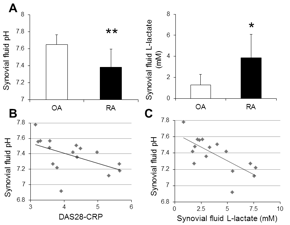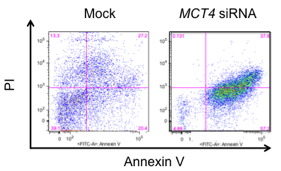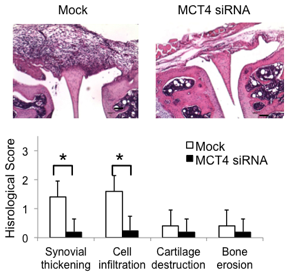Session Information
Session Type: ACR Concurrent Abstract Session
Session Time: 4:30PM-6:00PM
Background/Purpose: Synovial fluid pH is decreased in patients with rheumatoid
arthritis (RA); however, the underlying mechanisms are unclear. Here, we examined the mechanism by which synovial fluid pH is regulated and explore the
therapeutic strategy by manipulating this mechanism.
Methods: The pH and lactate concentration in synovial fluid
from RA and osteoarthritis (OA) patients were determined. Cultured synovial
fibroblasts (SFs) from the inflamed joints of patients with RA (RASFs) were
examined for the expression of ion transporters that regulate intracellular and extracellular pH. The ion transporter up-regulated in RASF lines was then
suppressed in RASFs by small interfering RNA (siRNA) and the effect of
transfection on viability and proliferation was investigated. Finally, we examined the therapeutic effect of electro-transfer of MCT4-specific siRNA into the articular synovium
of collagen-induced
arthritis (CIA) mice.
Results: The synovial fluid from RA patients had significantly lower pH
(p < 0.01) and higher lactate values (p < 0.05),
respectively, than the
synovial fluid from
OA patients (Figure 1A). Synovial fluid pH correlated inversely with both the patient
disease activity score (DAS)-28 CRP (r = -0.51, p < 0.05, Figure 1B) and synovial fluid lactate levels (r =
-0.71, p < 0.01, Figure 1C). RASFs exhibited up-regulated transcription of monocarboxylate transporter (MCT) 4 mRNA. MCT4 exports
intracellular lactate into the extracellular space. RASFs had significantly higher MCT4 protein
levels than osteoarthritis synovial
fibroblasts. Knockdown of MCT4
induced RASF apoptosis (Figure
2), thereby inhibiting their proliferation. Moreover, electro-transfer of MCT4-specific siRNA into the articular synovium of CIA mice significantly reduced the
severity of arthritis (p
< 0.05, Figure 3).
Conclusion: RA activity correlated with decreased synovial fluid pH.
This may be due to increased
MCT4 expression in
RASFs. Silencing MCT4 induced apoptosis in RASFs and reduced the
severity of CIA,
suggesting that MCT4 is a potential therapeutic target for inflammatory
arthritis.
Figure 1
Figure 2
Figure 3
To cite this abstract in AMA style:
Fujii W, Ashihara E, Nagahara H, Kukida Y, Seno T, Yamamoto A, Kohno M, Oda R, Taniguchi D, Fujiwara H, Kishida T, Mazda O, Kawahito Y. Monocarboxylate Transporter 4, Associated with the Acidification of Synovial Fluid, Is a Novel Therapeutic Target for Inflammatory Arthritis [abstract]. Arthritis Rheumatol. 2015; 67 (suppl 10). https://acrabstracts.org/abstract/monocarboxylate-transporter-4-associated-with-the-acidification-of-synovial-fluid-is-a-novel-therapeutic-target-for-inflammatory-arthritis/. Accessed .« Back to 2015 ACR/ARHP Annual Meeting
ACR Meeting Abstracts - https://acrabstracts.org/abstract/monocarboxylate-transporter-4-associated-with-the-acidification-of-synovial-fluid-is-a-novel-therapeutic-target-for-inflammatory-arthritis/



